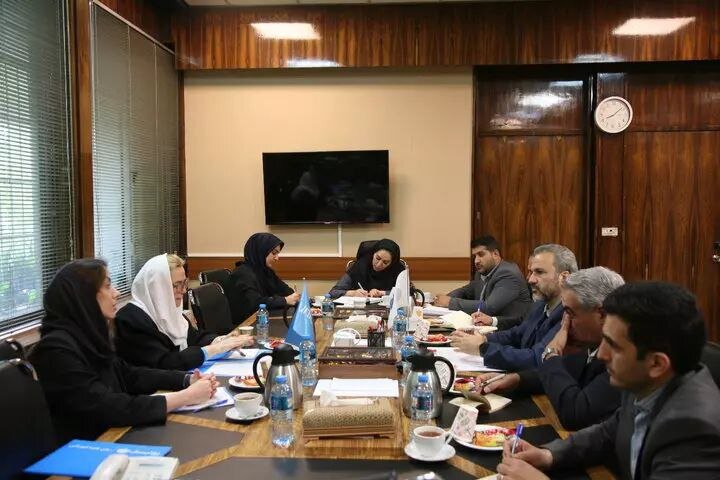Ministry of Interior, UNICEF promote co-op on refugees

TEHRAN – The head of the National Organization for Migration, Nader Yar-Ahmadi, and the United Nations Children’s Fund (UNICEF) ad interim Representative in Iran, Monika Oledzka Nielsen, have discussed ways for enhancing collaborations in different sectors including health, education, nutrition, and natural hazards to improve living conditions of refugees.
The two officials met on Monday in Tehran. Lauding Iran’s efforts in hosting refugees over the past forty years, Nielsen announced UNICEF's readiness to cooperate with the Ministry of Interior, highlighting the organization’s numerous experiences in providing education, health, and nutrition services in countries like India and Afghanistan, the Ministry of Interior reported.
Referring to the two-year work plan signed by the two sides in December 2024, Nielsen said cooperation on refugees will be an important part of the signed MOU.
The official also announced a new UNICEF-supported education program for female Afghan students deprived of schooling due to political and social problems. To facilitate the access of this group of students to education, UNICEF is willing to boost cooperation with the Ministry of Interior as well as educational institutions in Iran.
For his part, Yar-Ahmadi, underscoring the importance of education for foreign students, particularly Afghans, said some 700,000 Afghan students are studying in Iran. However, the lack of enough educational space in the country requires international organizations’ support to improve educational infrastructure.
Referring to unauthorized [foreign] students in the country, the official said that the Ministry of Interior is developing an educational online platform to facilitate their education. Moreover, those who are returning to their own home country will be able to benefit from virtual educational platforms. The official also stressed that the Ministry of Education, in cooperation with the private sector, will issue a permit to provide a school for these refugee students.
During the meeting, the officials also discussed ways to reduce the impacts of natural disasters in hazard-prone areas.
Two-year work plan
In December 2024, in a step towards addressing critical challenges facing children and their families in Iran, UNICEF and the Ministry of Interior signed a two-year work plan aimed at reducing poverty, mitigating disaster risks, and enhancing humanitarian support for refugees and host communities. Nielsen and Mehdi Javaheri, Advisor to the Minister and Head of the International Affairs, signed the two-year work plan.
This collaboration is set to strengthen community resilience and improve outcomes for vulnerable children across the country, UNICEF website announced in a press release on December 8, 2024.
By enhancing disaster awareness and risk mitigation at the community level, the work plan will help protect children from the devastating impacts of natural and man-made disasters.
Additionally, it seeks to streamline identification and support processes for vulnerable households, providing critical assistance under the poverty alleviation pillar of the United Nations Sustainable Development Cooperation Framework (UNSDCF).
The partnership also paves the way for expanded ties for collaboration with Ministry of Interior-affiliated entities, such as the Social Affairs Organization, National Disaster Management Organization (NDMO), and CAFIA (Center for Aliens and Foreign Immigrants Affairs), as well as national NGOs. This networked approach is expected to amplify the reach and impact of UNICEF’s programmes, ensuring no child is left behind.
Implementation of the work plan will commence immediately, focusing on high-priority areas identified through months of collaboration. The partnership’s outcomes will be reviewed at the end of 2025 to assess progress and determine further steps to strengthen the impact of these initiatives.
This partnership underscores UNICEF’s dedication to supporting Iran’s children and communities by collaborating with national partners to build a resilient and inclusive society.
MT/MG
Leave a Comment